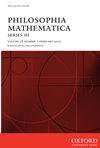我们如何在语义上个性化自然数?__
IF 0.6
1区 哲学
Q2 HISTORY & PHILOSOPHY OF SCIENCE
引用次数: 2
摘要
非专家如何挑选数字以供参考?Linnebo认为,他们这样做是基于数字的序数性质的同一性标准。另一方面,新逻辑学家在援引休谟原理时,声称基本性质是个性化的基础。我讨论了认知科学和语言学的经验数据,以回答非专家如何在实践中更好地个性化数字。我利用这些发现开发了一种混合序数和基数性质的替代方法,为这个问题提供了一个详细的(尽管没有最终证明)答案:我们实际上如何在语义上个性化数字?本文章由计算机程序翻译,如有差异,请以英文原文为准。
How Do We Semantically Individuate Natural Numbers?
How do non-experts single out numbers for reference? Linnebo has argued that they do so using a criterion of identity based on the ordinal properties of numerals. Neo-logicists, on the other hand, claim that cardinal properties are the basis of individuation, when they invoke Hume's Principle. I discuss empirical data from cognitive science and linguistics to answer how non-experts individuate numbers better in practice. I use those findings to develop an alternative account that mixes ordinal and cardinal properties to provide a detailed (though not conclusively proven) answer to the question: how do we in fact semantically individuate numbers?
求助全文
通过发布文献求助,成功后即可免费获取论文全文。
去求助
来源期刊

Philosophia Mathematica
HISTORY & PHILOSOPHY OF SCIENCE-
CiteScore
1.70
自引率
9.10%
发文量
26
审稿时长
>12 weeks
期刊介绍:
Philosophia Mathematica is the only journal in the world devoted specifically to philosophy of mathematics. The journal publishes peer-reviewed new work in philosophy of mathematics, the application of mathematics, and computing. In addition to main articles, sometimes grouped on a single theme, there are shorter discussion notes, letters, and book reviews. The journal is published online-only, with three issues published per year.
 求助内容:
求助内容: 应助结果提醒方式:
应助结果提醒方式:


